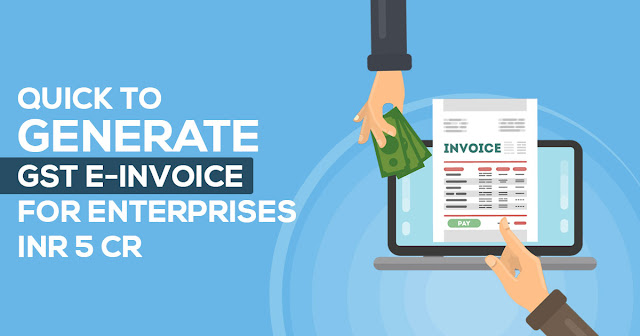A Step-by-Step Guide to Generate GST E-Invoices
Under the Finance Ministry, The Central Board of Indirect Taxes and Customs (CBIC) issued a notice through a notification last week on the reduction in the revenue threshold for e-invoicing. As per the notification, enterprises having revenue of more than Rs. 5 crores, from the previous Rs. 10 crores, in any financial year will be required to produce e-invoices for business-to-business (B2B) transactions including supply of goods and services and exports which will come in action from August 1, 2023.
Goods and Services Tax Network (GSTN),through the e-invoice system, substantiates B2B invoices electronically which are uploaded by suppliers and the Invoice Registration Portal (IRP) generates an identification number for every invoice. Validated invoice data is transferred from the IRP to the GST portal in real time, eradicating the requirement to manually enter data during the filing of the GSTR-1 return.
CBIC's new turnover criteria would bring in more small businesses with turnover ranging from Rs 5 crore to Rs 10 crore. Currently, the micro-enterprises that have a turnover of less than Rs 5 cr according to the new norms of MSME would stay outside of the purview of the e-invoice.
Below is the Method to Generate an E-invoice in GST:
- On your accounting/billing/ERP software build your GST invoices in the stipulated format of e-invoice schema – a standard format for developing invoices that comprise the mandatory things and optional parts.
- You should know that your software supports JSON file format for making invoices in that format. Not only Gen GST Cloud software supports JSON format schema but also provides a JSON validation feature so that taxpayer can save entering wrong details on the IRP portal.
- For every invoice on the IRP, upload the JSON file. For every invoice uploaded, a 64-character Invoice Registration Number (IRN) (also called a hash) is generated.
- When your ERP or accounting software would get combined with IRP via a GST Suvidha Provider or integrated directly or via additional modes then the invoice data shall get automatically shared via the software with IRP.
- After that, the IRP verifies your invoices and cross-checks the central registry of GST for the case of any duplicity of the data.
- Post verifying the JSON files the IRP shall generate the IRN or hash for every invoice file and shall indeed sign the file digitally.
- For invoices with components including your and the buyer’s or recipient’s GSTINs, all invoice-related details, invoice value, etc the IRP shall then generate a QR code.
- The digitally signed e-invoices with IRN and QR code on them shall be sent to you and indeed shared with the GST system and e-way bill.
- The GSTR-1 form of the supplier and GSTR-2A of the buyer or recipient will be updated in the GST system. Indeed Part A of the e-way bill shall get auto-populated.


Comments
Post a Comment